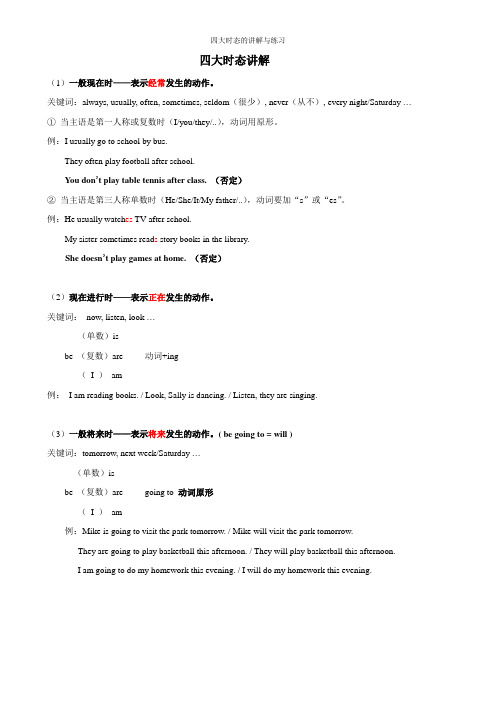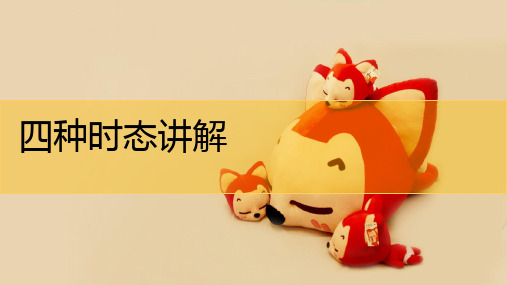时态串讲4配音、动画、含习题)
- 格式:ppt
- 大小:3.91 MB
- 文档页数:21

四大时态讲解(1)一般现在时——表示经常发生的动作。
关键词:always, usually, often, sometimes, seldom(很少), never(从不), every night/Saturday …①当主语是第一人称或复数时(I/you/they/..),动词用原形。
例:I usually go to school by bus.They often play football after school.Y ou don’t play table tennis after class. (否定)②当主语是第三人称单数时(He/She/It/My father/..),动词要加“s”或“es”。
例:He usually watch es TV after school.My sister sometimes read s story books in the library.She doesn’t play games at home. (否定)(2)现在进行时——表示正在发生的动作。
关键词:now, listen, look …(单数)isbe (复数)are 动词+ing(I )am例:I am reading books. / Look, Sally is dancing. / Listen, they are singing.(3)一般将来时——表示将来发生的动作。
( be going to = will )关键词:tomorrow, next week/Saturday …(单数)isbe (复数)are going to 动词原形(I )am例:Mike is going to visit the park tomorrow. / Mike will visit the park tomorrow.They are going to play basketball this afternoon. / They will play basketball this afternoon.I am going to do my homework this evening. / I will do my homework this evening.(4)一般过去时基础知识1 表示过去已经发生的事情,通常用“last week, just now, yesterday”等词。

小学4种时态知识点总结一、简单现在时1. 标志词:always, usually, often, sometimes, every day, on Sundays, etc.2. 构成:主语 + 动词原形(动词第三人称单数在词尾加-s)二、一、两种帮助动词和动词原形构成的现在进行时1. be 动词(am, is, are)+ 动词ing形式2. 构成:主语 + be动词 + V-ing三、一、两种助动词和动词原形构成的一般过去时1. 助动词did + 动词原形2. 构成:主语 + did + 动词原形四、将来时1. 标志词:tomorrow, next week, in the future, etc.2. 构成:主语 + will + 动词原形以上是小学四年级英语时态的基本知识点。
下面我们通过例句来巩固和强化这些知识点。
1. 简单现在时:She always goes to school by bus.I usually play basketball on weekends.My mother often cooks delicious food for us.We sometimes visit our grandparents on Sundays.He brushes his teeth every day.2. 现在进行时:I am reading a book now.They are playing football in the playground.She is watching TV at home.He is eating an apple in the kitchen.We are swimming in the pool.3. 一般过去时:I watched a movie last night.He played with his friends after school.We visited the zoo on Sunday.She finished her homework yesterday.They cleaned their rooms this morning.4. 将来时:I will go to the park tomorrow.We will have a picnic next week.She will visit her aunt in the future.They will play video games in the evening.通过以上例句,我们可以看到不同时态的应用场景和句型结构。


初中时态串讲——一般态一、一般现在时(Simple Present Tense)1. 动词原形作谓语:They often go hiking on weekends.(他们经常在周末去远足。
)2. 动词原形加-s,或者第三人称单数主语作谓语:He runs three miles every day.(他每天跑三英里。
)3. 动词原形加-es:She washes her hair twice a week.(她每周洗两次头发。
)4. 特殊形式:am/is/are+动词-ing,用于表达正在进行的动作:She is reading a book at the moment.(她此刻正在看书。
)二、一般过去时(Simple Past Tense)1. 动词过去式作谓语:They visited the Great Wall last summer.(去年夏天他们参观了长城。
)2. 动词过去式加-ed,或者用了特殊的过去式形式:I woke upearly this morning.(今天早晨我起得很早。
)3. 动词过去式以不发音的e结尾:She danced gracefully at the party.(她在舞会上优雅地跳舞。
)三、一般将来时(Simple Future Tense)1. 表示将来的动作或状态:I will help you with your homework tomorrow.(明天我会帮你做作业。
)2. 表示打算或意图:She is going to buy a new car next month.(她打算下个月买辆新车。
)3. 表示预测或推测:It will rain this afternoon.(今天下午会下雨。
)四、一般现在进行时(Present Continuous Tense)1. am/is/are+动词-ing作谓语:They are playing football in the park now.(他们现在在公园里踢足球。


小学四种时态试题及答案一、一般现在时1. 我每天上学。
A. go to schoolB. goes to schoolC. am going to schoolD. am going to go to school答案:A2. 他经常帮助别人。
A. He often help others.B. He often helps others.C. He often helped others.D. He often helping others.答案:B3. 我们喜欢游泳。
A. We like to swim.B. We likes to swim.C. We liked to swim.D. We liking to swim.答案:A二、一般过去时4. 昨天我去了图书馆。
A. I go to the library yesterday.B. I went to the library yesterday.C. I am going to the library yesterday.D. I go to the library yesterday.答案:B5. 他们上周看了电影。
A. They watch a movie last week.B. They watched a movie last week.C. They are watching a movie last week.D. They will watch a movie last week.答案:B6. 她昨天买了一本书。
A. She buy a book yesterday.B. She bought a book yesterday.C. She is buying a book yesterday.D. She will buy a book yesterday.答案:B三、一般将来时7. 明天我要去看医生。
A. I am going to see a doctor tomorrow.B. I go to see a doctor tomorrow.C. I went to see a doctor tomorrow.D. I will go to see a doctor tomorrow.答案:A8. 他们将要参加比赛。
英语四大时态练习题1. Past Simple (一般过去时)- Question: What did you do last weekend?- Answer: I visited the museum and watched a movie.- Question: Where did your friends go on their vacation? - Answer: They went to the beach and enjoyed the sun.2. Present Simple (一般现在时)- Question: What time does the store open?- Answer: The store opens at 9 a.m.- Question: What do you usually do after work?- Answer: I usually go to the gym and then have dinner.3. Future Simple (一般将来时)- Question: What will you do tomorrow?- Answer: I will go to the library to return some books.- Question: What will your sister do next summer?- Answer: She will travel to Europe for a month.4. Past Continuous (过去进行时)- Question: What were you doing at 5 p.m. yesterday?- Answer: I was cooking dinner for my family.- Question: What was your brother doing when you called him?- Answer: He was playing basketball with his friends.5. Present Continuous (现在进行时)- Question: What are you doing right now?- Answer: I am working on a project for my job.- Question: What are the children doing in the garden?- Answer: They are planting flowers and watering the plants.6. Future Continuous (将来进行时)- Question: What will you be doing at this time tomorrow? - Answer: I will be attending a meeting.- Question: What will your friends be doing next weekend? - Answer: They will be hiking in the mountains.7. Present Perfect (现在完成时)- Question: Have you finished your report?- Answer: Yes, I have finished it.- Question: Has she traveled to any new countries this year?- Answer: Yes, she has traveled to Japan and Australia.8. Past Perfect (过去完成时)- Question: Had you finished your homework before the teacher arrived?- Answer: Yes, I had finished it.- Question: Had they completed the project before the deadline?- Answer: Yes, they had completed it.9. Future Perfect (将来完成时)- Question: Will you have finished your project by the end of the month?- Answer: Yes, I will have finished it by then.- Question: Will your friends have arrived by the time we get to the airport?- Answer: Yes, they will have arrived by then.。
小学英语四大时态复习教学目标:1. 掌握四大时态的结构和用法3. 以辅音字母+y结尾的单词,变y为i,再加es。
butterflybutterfliesfamilyfamilies4. 以o结尾的单词:有生命加stomatotomatoespotatopotatoes无生命加espianopianosphotophotoszoozoosradioradios时态专题综合训练一、单项选择1. John _____ football.A. likes playingB. likes playC. like play2. Does your mother _____ football?A. likeB. likesC. like play3. They usually _____ TV in the evening.A. watchB. will watchC. are watching4. —What do you usually do on the weekend?—I often ____.A. do my homeworkB. did my homeworkC. doing my homework5. I don’t like _____ thrillers(恐怖片)______ playing baseball.A. watching; orB. watching; andC. to watch; or6. Bob often _____ to school.A. walkB. walksC. walked7. My pen ______ on my desk ten minutes ago. But it _____ there now.A. is; isn’tB. was; isn’tC. is; is8. Mike is _____ after his classmates.A. runsB. runingC. running9. Be quiet! The babies ________.A. sleepB. are sleepingC. slept10.______ he _____ his homework yesterday?A. Does; doB. Did; didC. Did; do11. —What did you do last weekend.—I ______.A. go swimmingB. did my homeworkC. went swim12. —What’s your hobby?—_____ is my hobby.A. Collecting stampsB. Collect stampsC. Stamps13. —Where were you just now?—I _____ at school.A. isB. wasC. were14. ______ he ______ his grandparents last month?A. Did; visitedB. Did; visitC. Do; visited15. Last week, we _____ a _____ race.A. hard; runningB. have; runningC. had; running16. I______ to the park last week.A. goB. wentC. going17. If I _____ you tomorrow, I will give you the receipt(收据)。